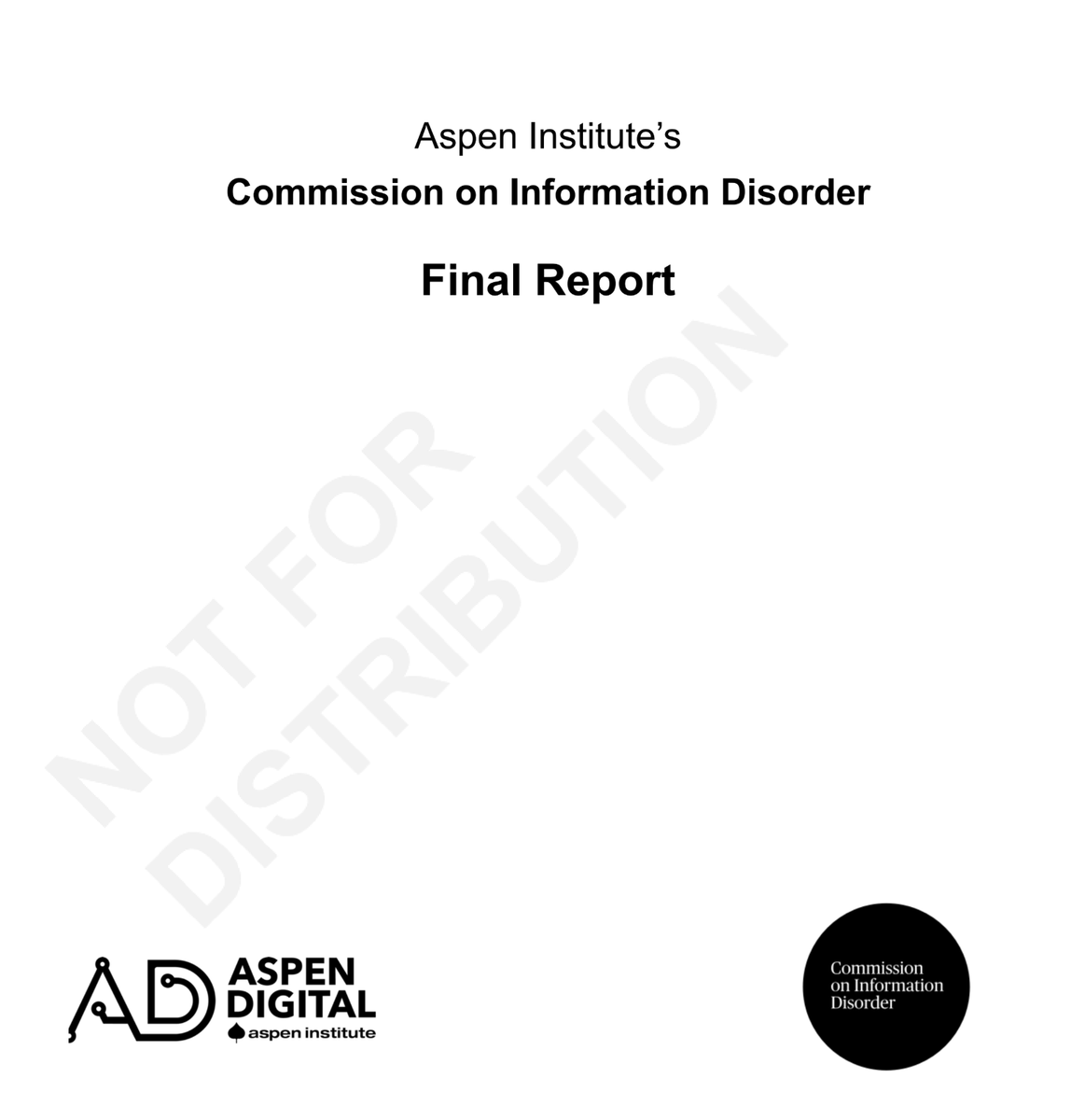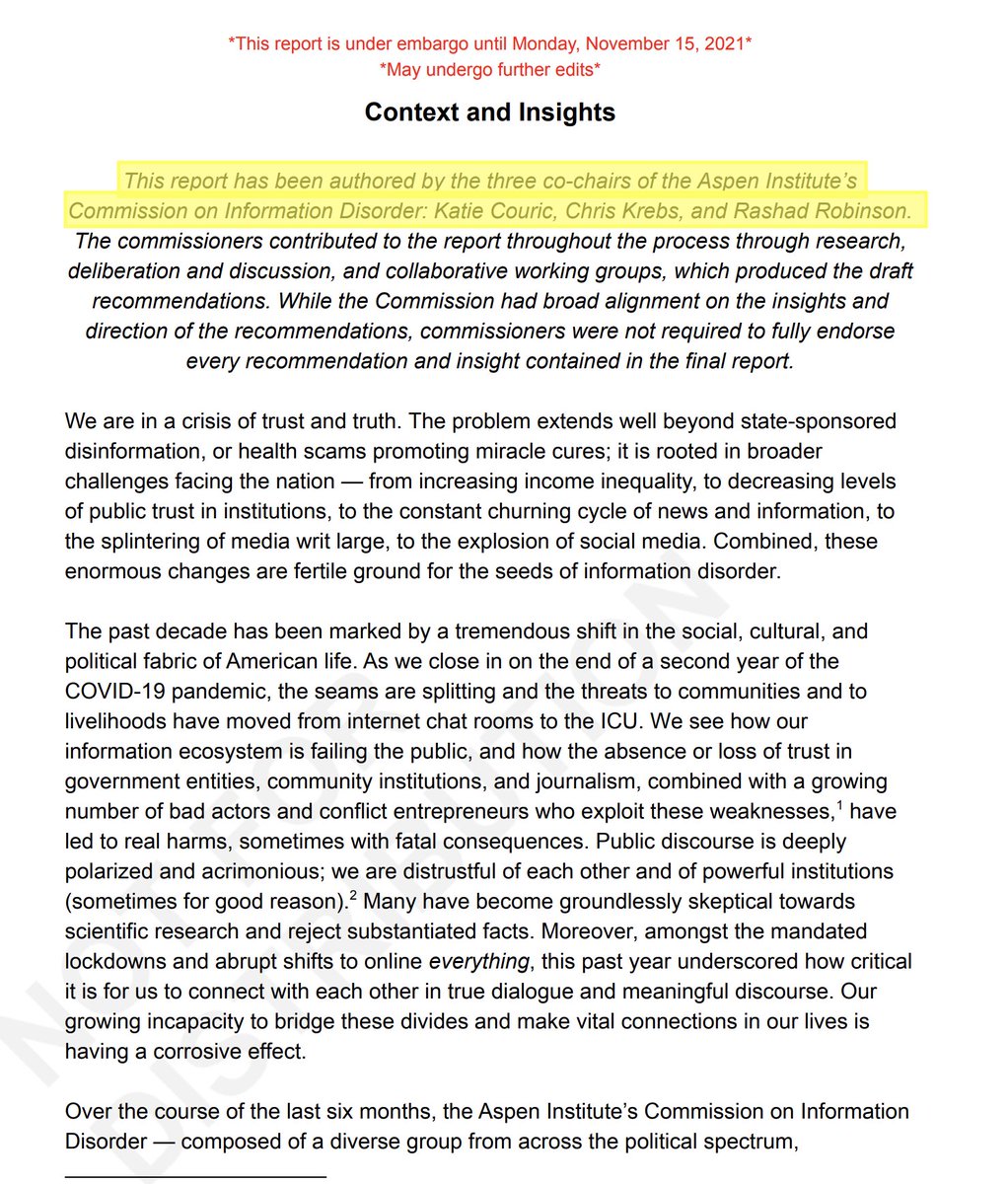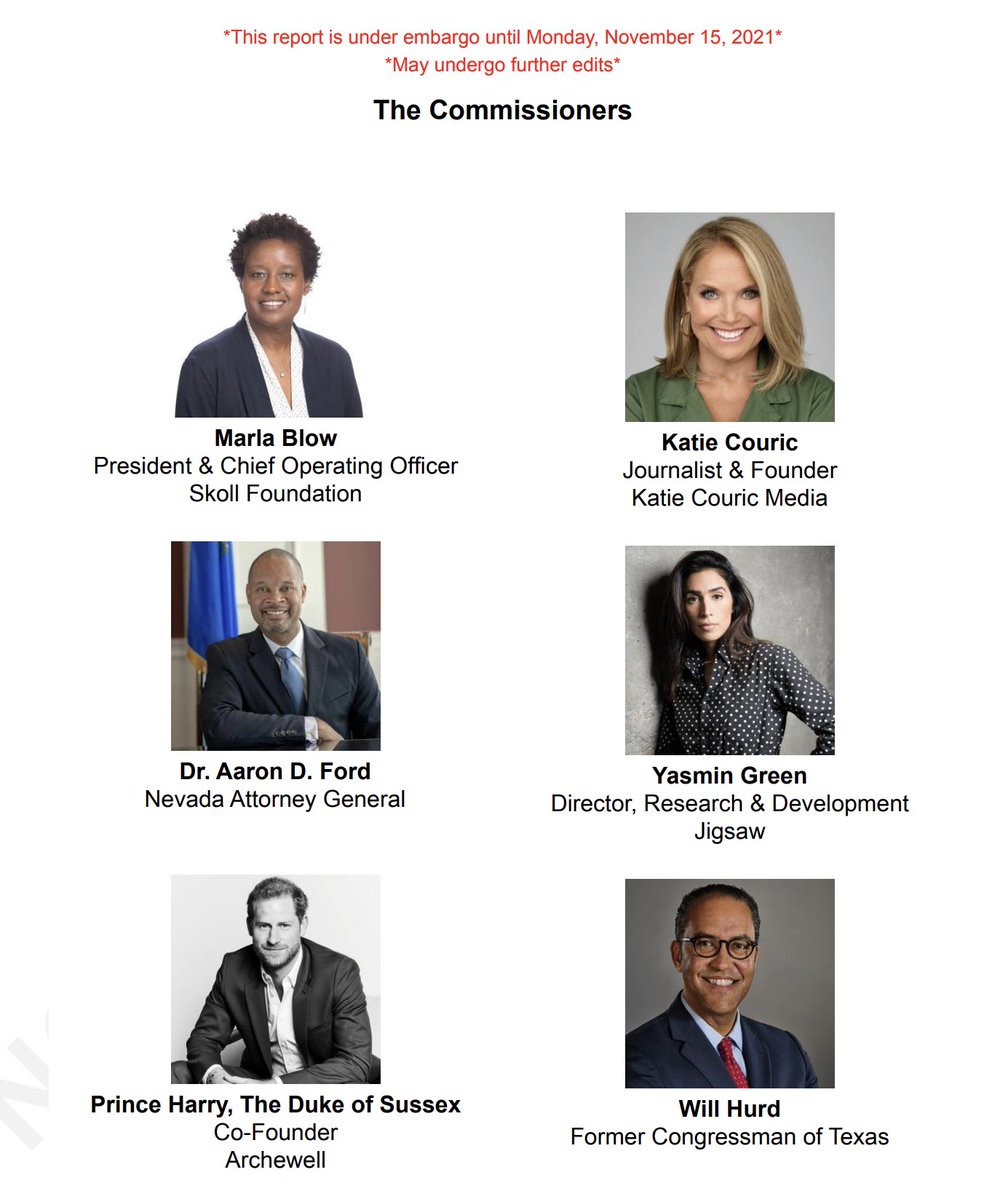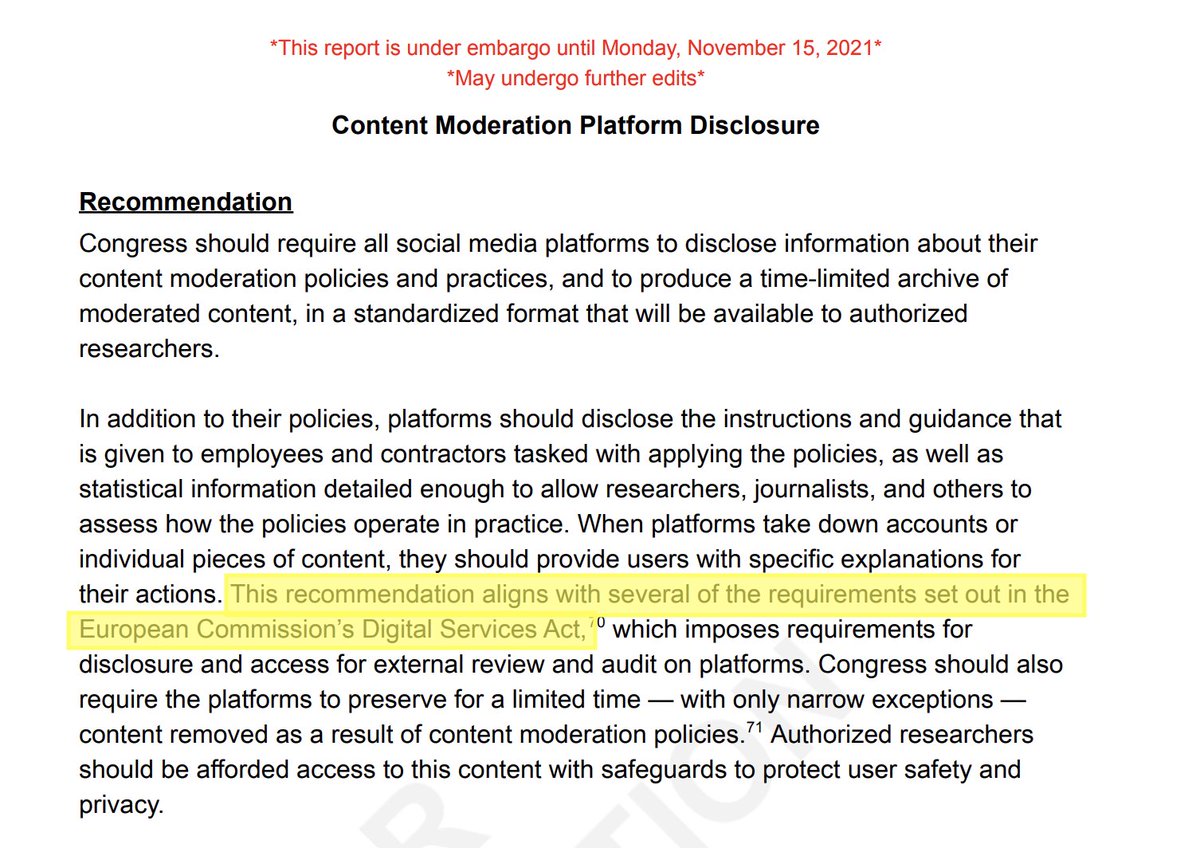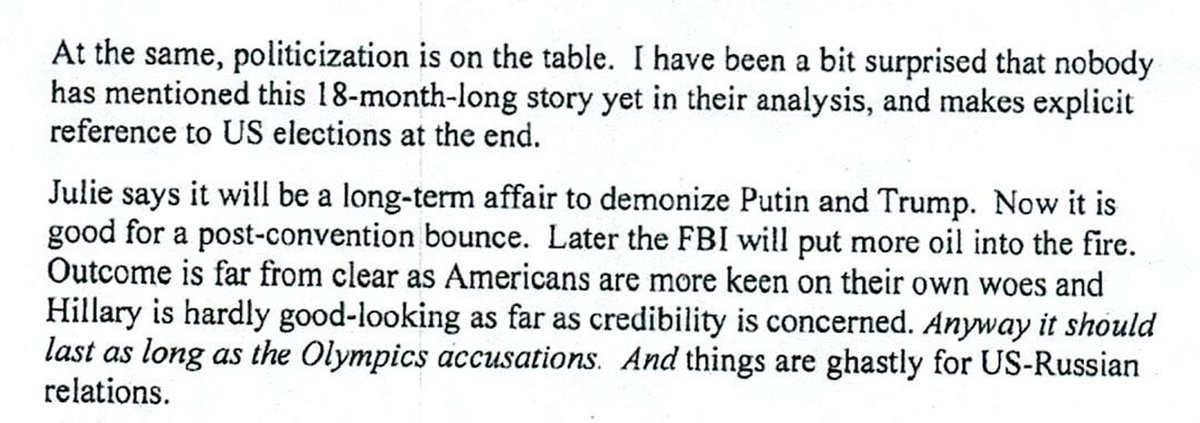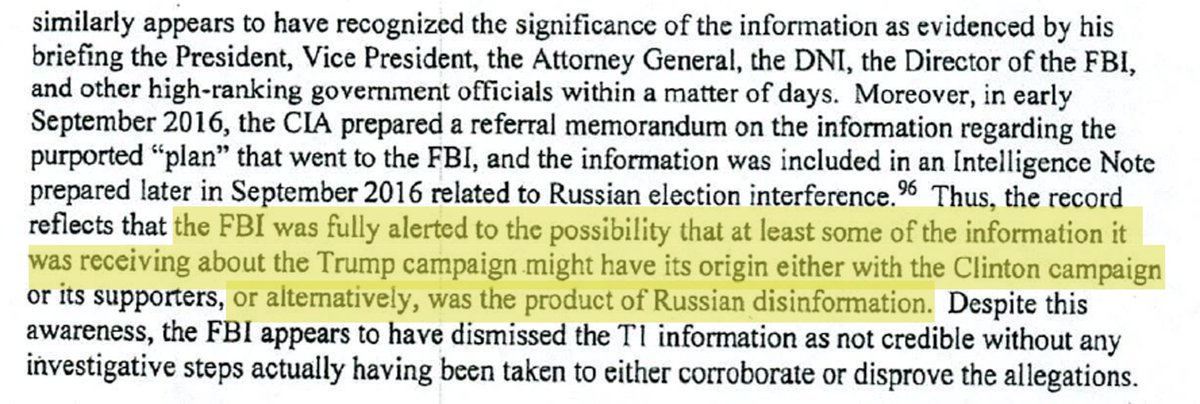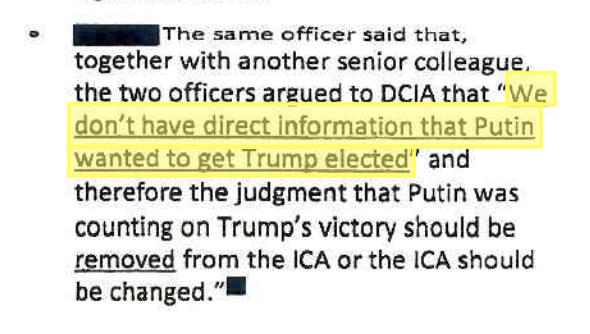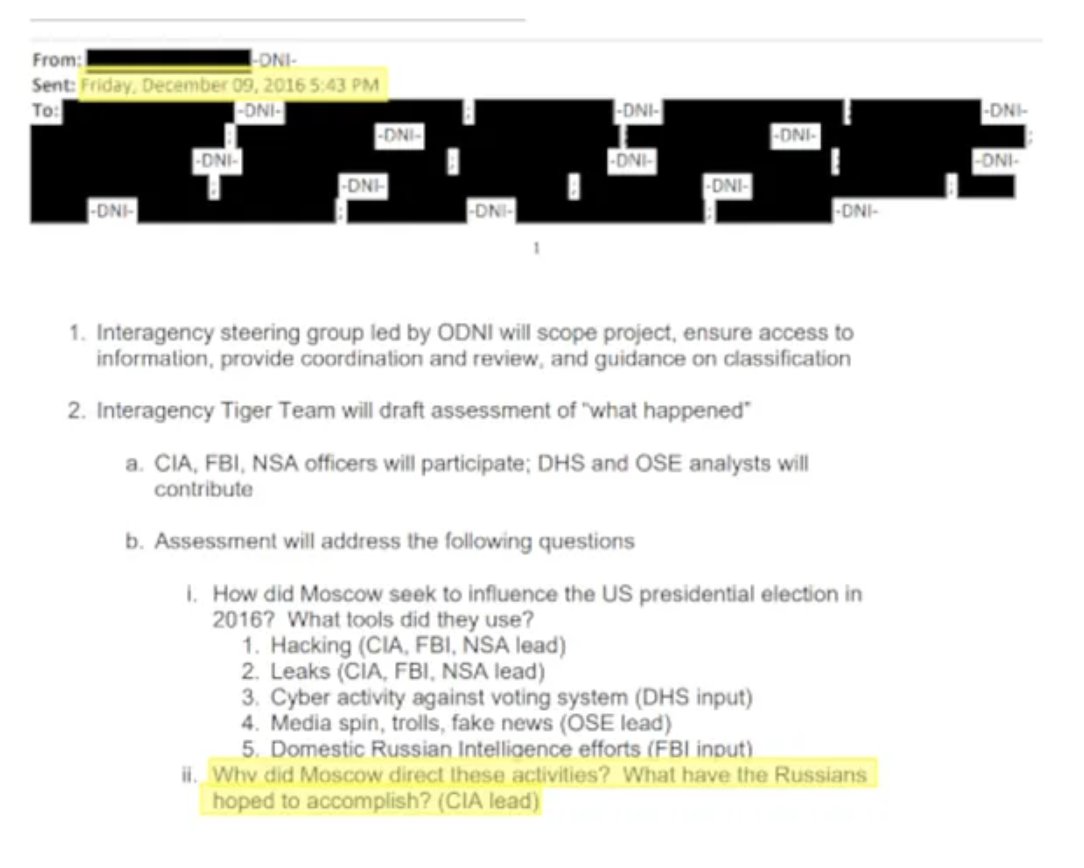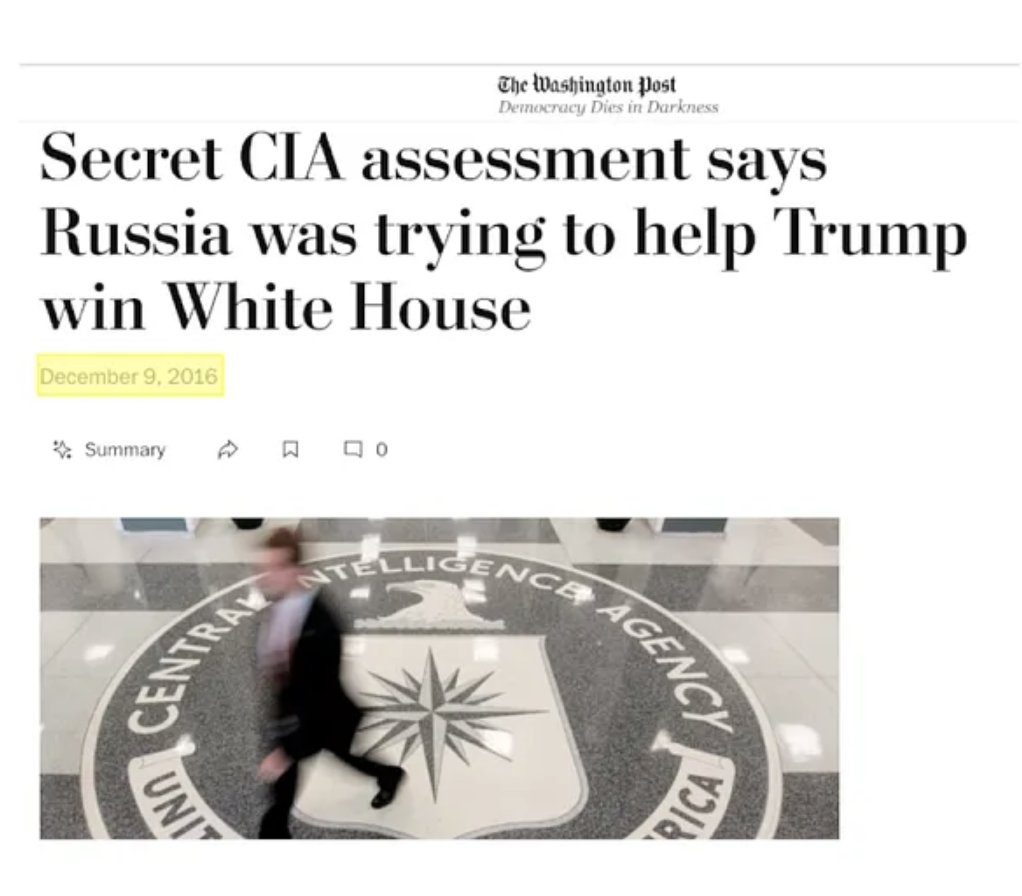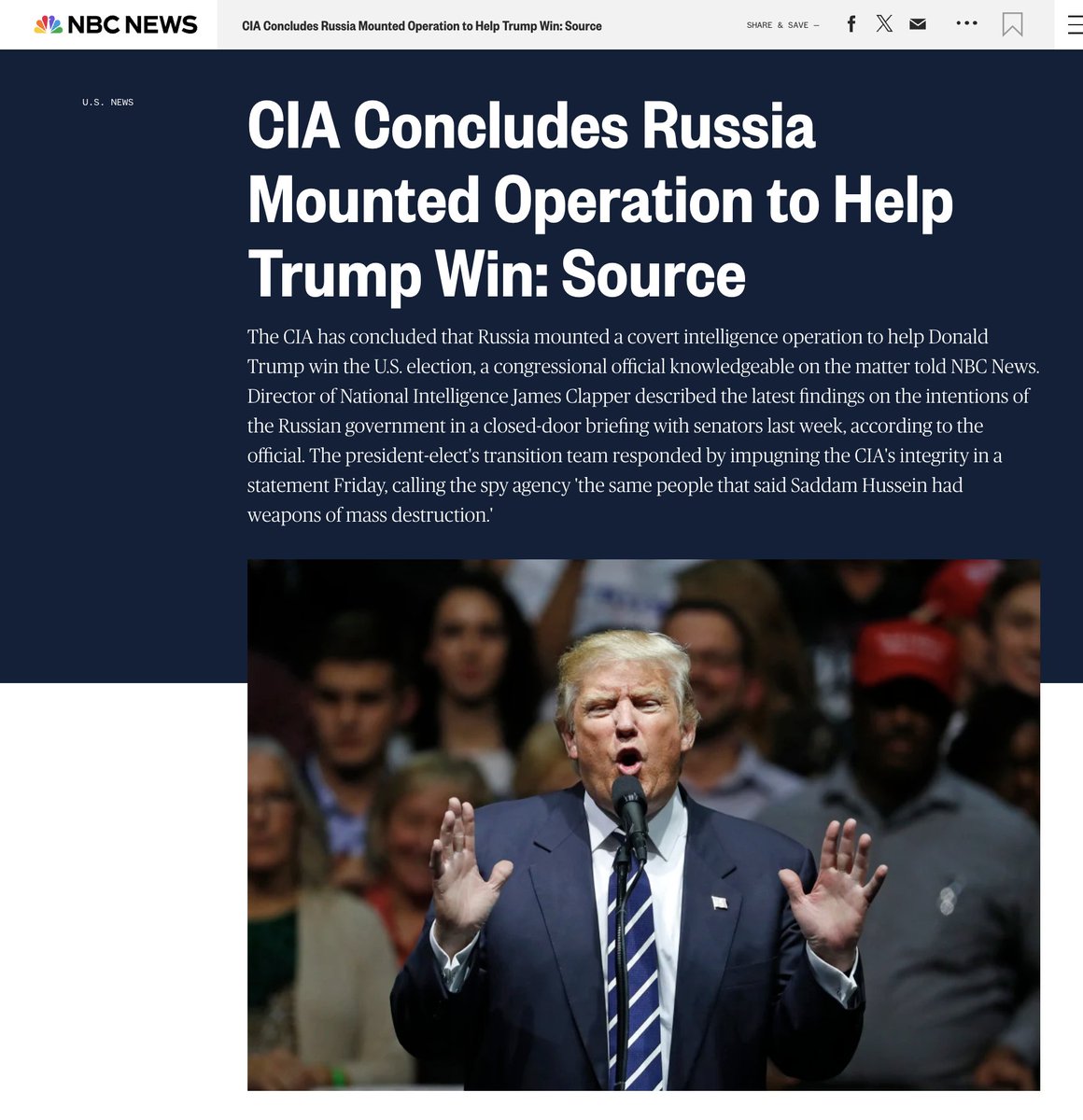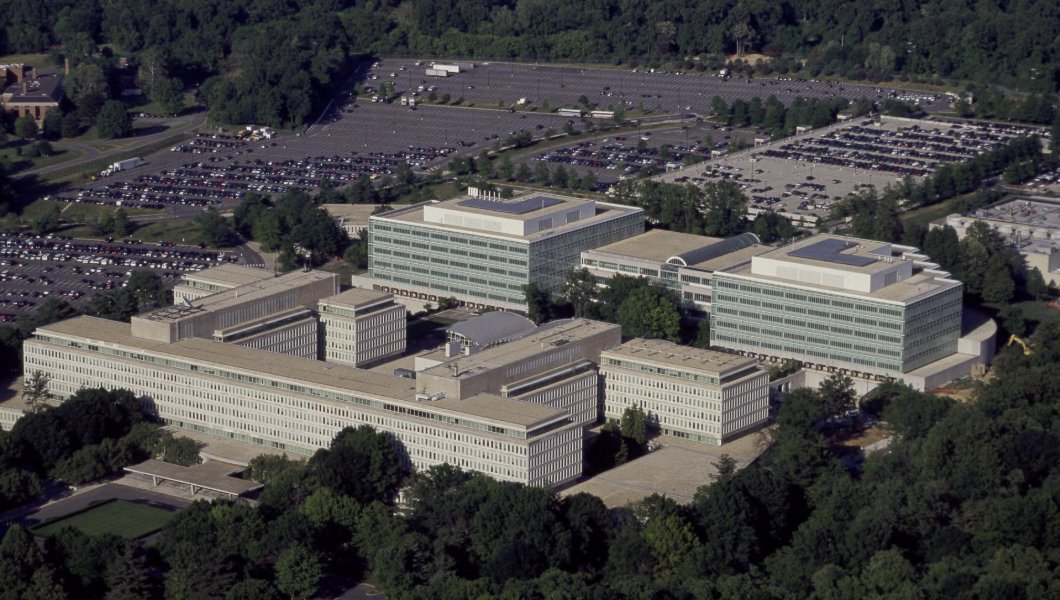1.THREAD: The Twitter Files
How Twitter Let the Intelligence Community In
How Twitter Let the Intelligence Community In
2.In August 2017, when Facebook decided to suspend 300 accounts with “suspected Russian origin,” Twitter wasn’t worried. Its leaders were sure they didn’t have a Russia problem.
3.“We did not see a big correlation.”
“No larger patterns.”
“FB may take action on hundreds of accounts, and we may take action on ~25.”


“No larger patterns.”
“FB may take action on hundreds of accounts, and we may take action on ~25.”

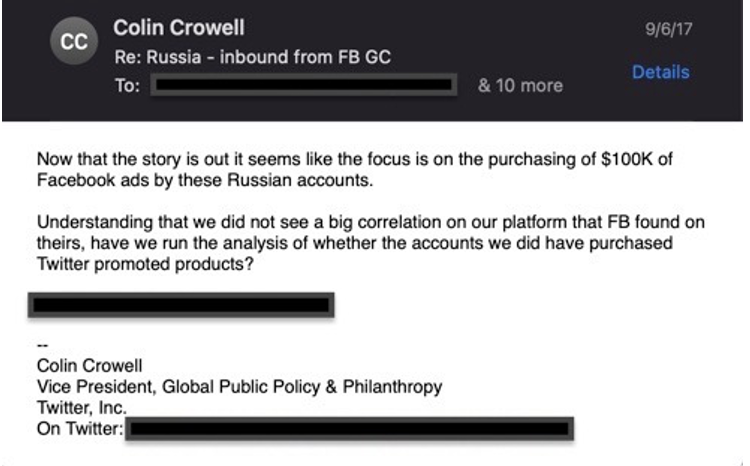

4.“KEEP THE FOCUS ON FB”: Twitter was so sure they had no Russia problem, execs agreed the best PR strategy was to say nothing on record, and quietly hurl reporters at Facebook: 



5.“Twitter is not the focus of inquiry into Russian election meddling right now - the spotlight is on FB,” wrote Public Policy VP Colin Crowell: 
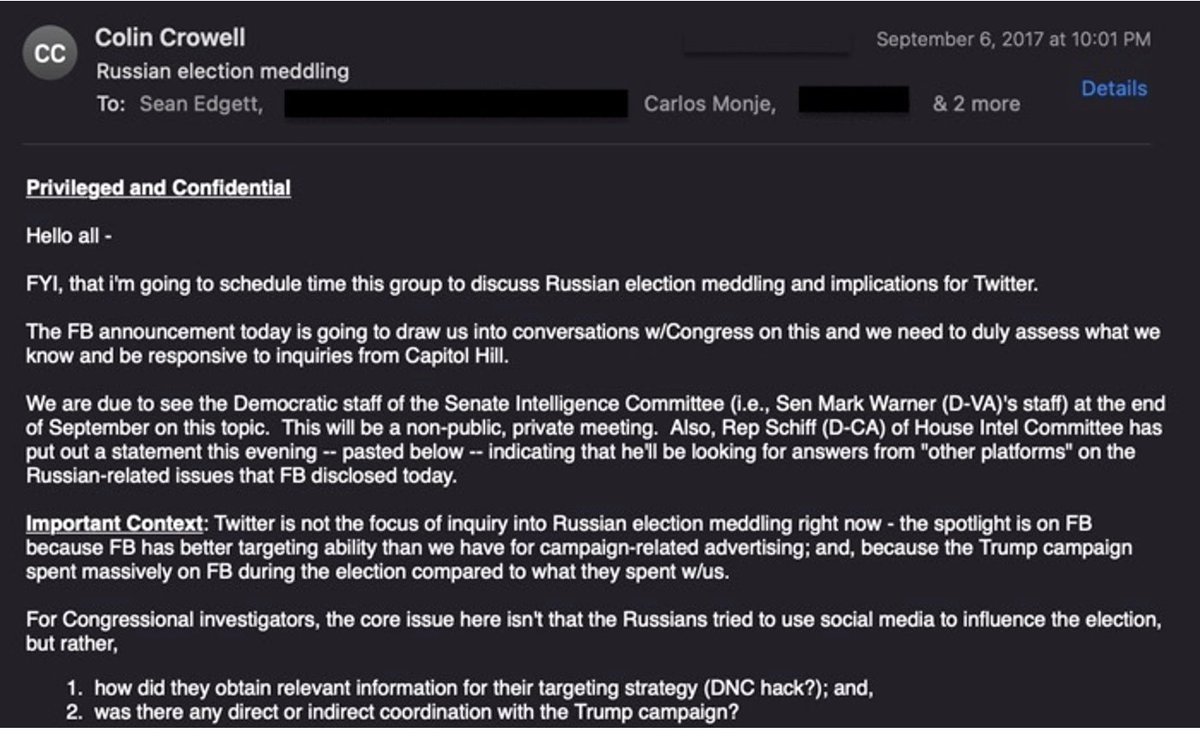
6.In September, 2017, after a cursory review, Twitter informed the Senate it suspended 22 possible Russian accounts, and 179 others with “possible links” to those accounts, amid a larger set of roughly 2700 suspects manually examined.
7.Receiving these meager results, a furious Senator Mark Warner of Virginia – ranking Democrat on the Intelligence Committee – held an immediate press conference to denounce Twitter’s report as “frankly inadequate on every level.” 

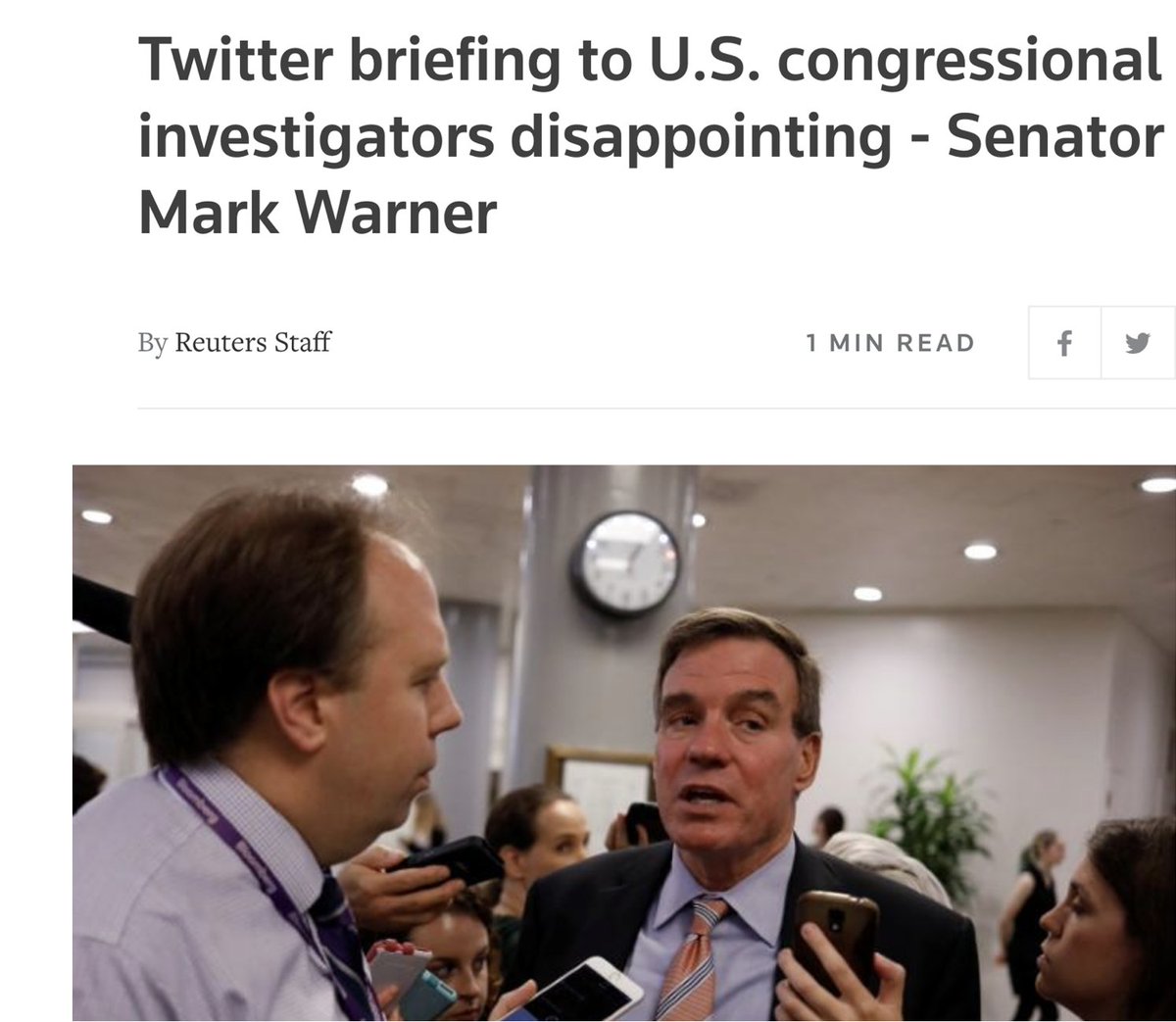

8.“#Irony,” mused Crowell the day after Warner’s presser, after receiving an e-circular from Warner’s re-election campaign, asking for “$5 or whatever you can spare.”
“LOL,” replied General Counsel Sean Edgett.
“LOL,” replied General Counsel Sean Edgett.
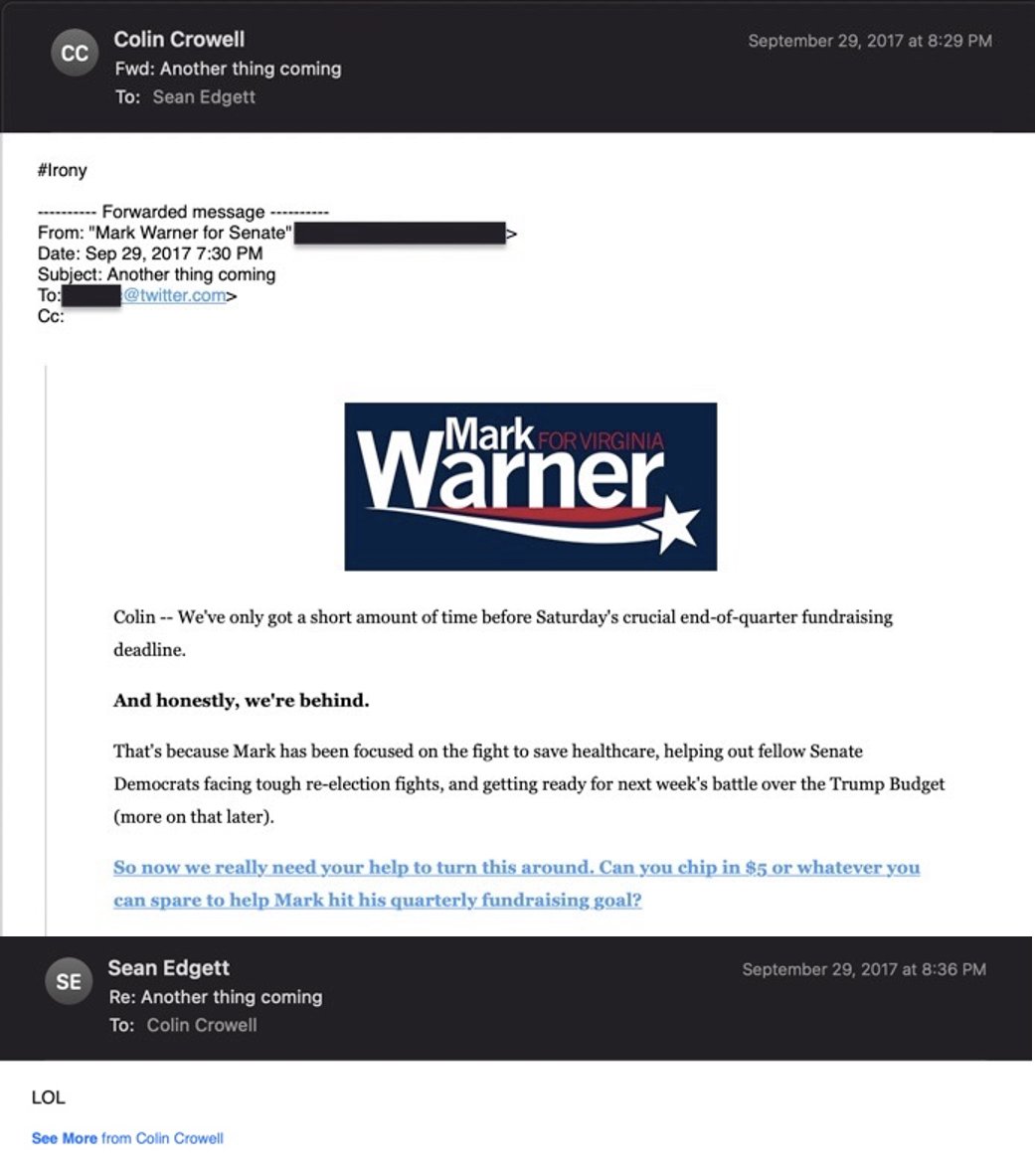
9.“KEEP PRODUCING MATERIAL” After meeting with congressional leaders, Crowell wrote: “Warner has political incentive to keep this issue at top of the news, maintain pressure on us and rest of industry to keep producing material for them.” 
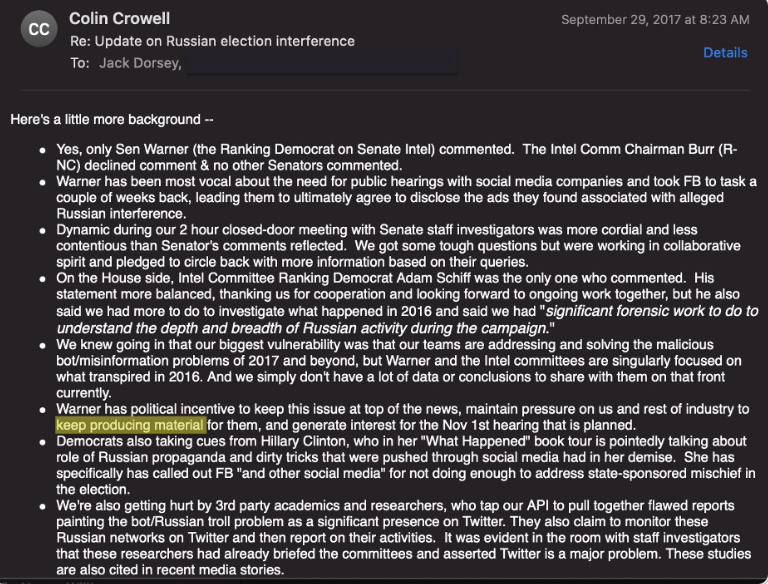
10.“TAKING THEIR CUES FROM HILLARY CLINTON” Crowell added Dems were taking cues from Hillary Clinton, who that week said: “It’s time for Twitter to stop dragging its heels and live up to the fact that its platform is being used as a tool for cyber-warfare.” 

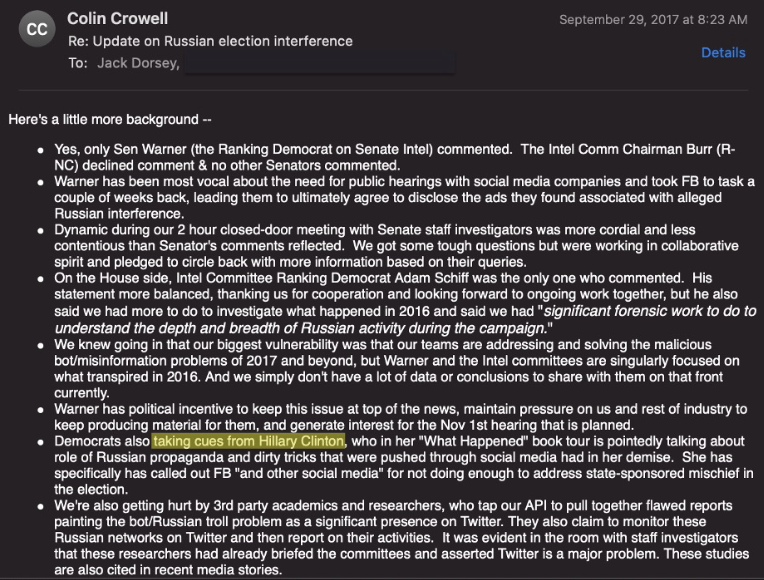

11. In growing anxiety over its PR problems, Twitter formed a “Russia Task Force” to proactively self-investigate. 
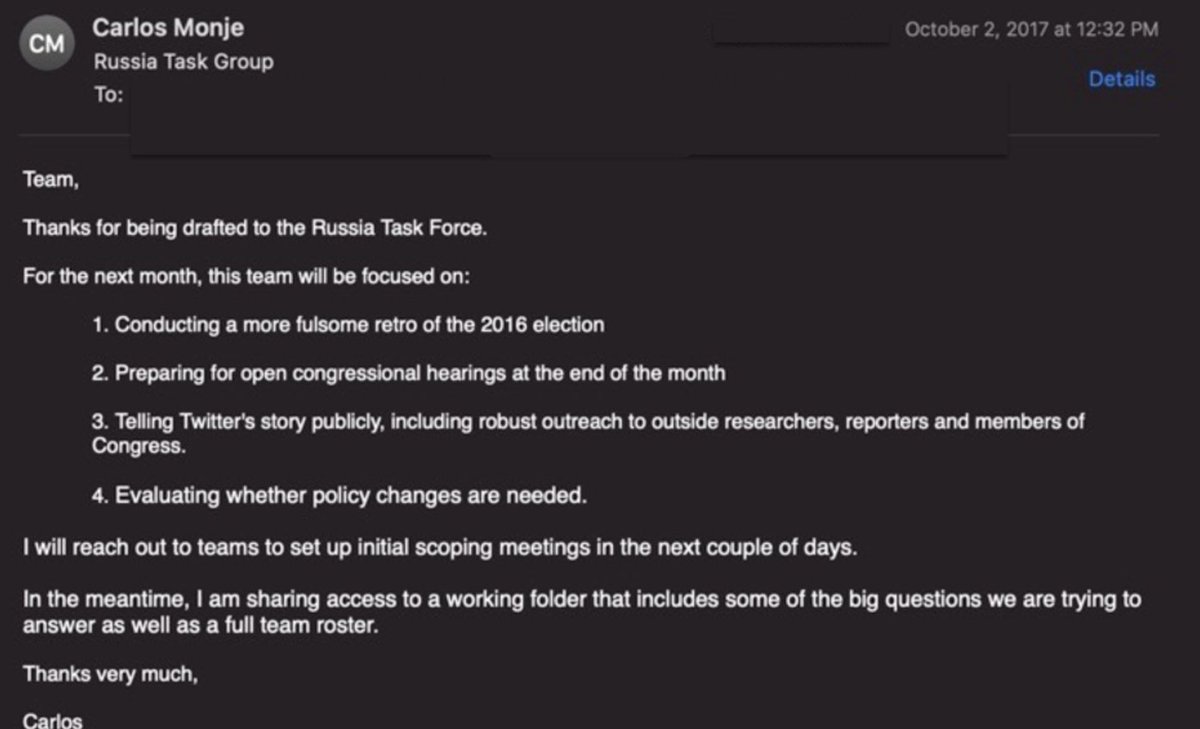
12.The “Russia Task Force” started mainly with data shared from counterparts at Facebook, centered around accounts supposedly tied to Russia’s Internet Research Agency (IRA). But the search for Russian perfidy was a dud: 

13. OCT 13 2017: “No evidence of a coordinated approach, all of the accounts found seem to be lone-wolf type activity (different timing, spend, targeting, <$10k in ad spend).” 

14.OCT 18 2017: “First round of RU investigation… 15 high risk accounts, 3 of which have connections with Russia, although 2 are RT.” 

15.OCT 20 2017: “Built new version of the model that is lower precision but higher recall which allows to catch more items. We aren’t seeing substantially more suspicious accounts. We expect to find ~20 with a small amount of spend.” 

16.OCT 23 2017: “Finished with investigation… 2500 full manual account reviews, we think this is exhaustive… 32 suspicious accounts and only 17 of those are connected with Russia, only 2 of those have significant spend one of which is Russia Today...remaining <$10k in spend.” 

17.Twitter’s search finding “only 2” significant accounts, “one of which is Russia Today,” was based on the same data that later inspired panic headlines like “Russian Influence Reached 126 Million Through Facebook Alone”: 
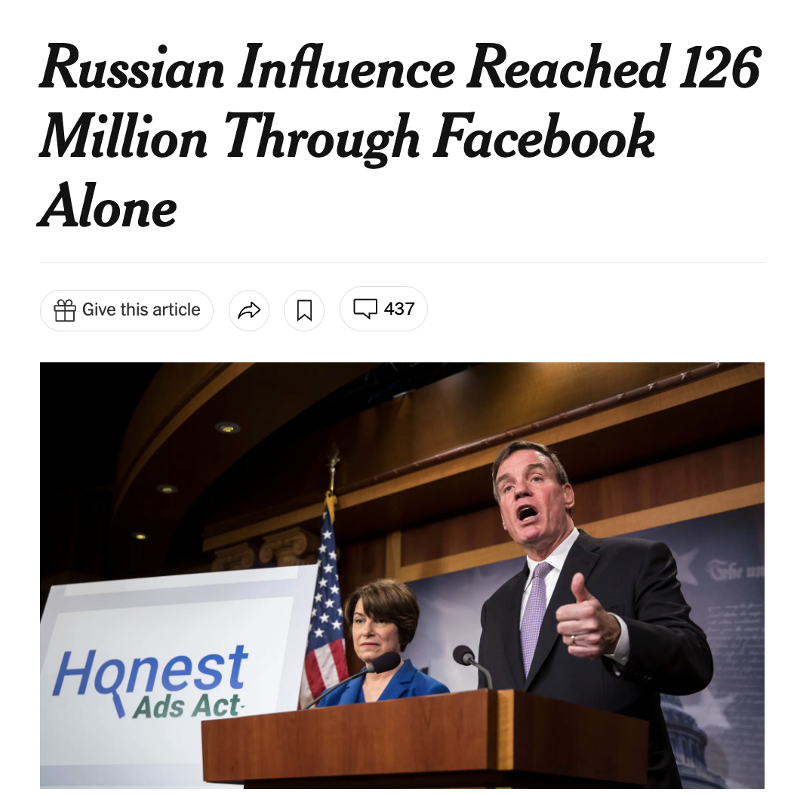
18.The failure of the “Russia task force” to produce “material” worsened the company’s PR crisis.
19.In the weeks after Warner’s presser, a torrent of stories sourced to the Intel Committee poured into the news, an example being Politico’s October 13, “Twitter deleted data potentially crucial to Russia probes.” 

20.“Were Twitter a contractor for the FSB… they could not have built a more effective disinformation platform,” Johns Hopkins Professor (and Intel Committee “expert”) Thomas Rid told Politico. 

21.As congress threatened costly legislation, and Twitter began was subject to more bad press fueled by the committees, the company changed its tune about the smallness of its Russia problem.
22.“Hi guys.. Just passing along for awareness the writeup here from the WashPost today on potential legislation (or new FEC regulations) that may affect our political advertising,” wrote Crowell. 
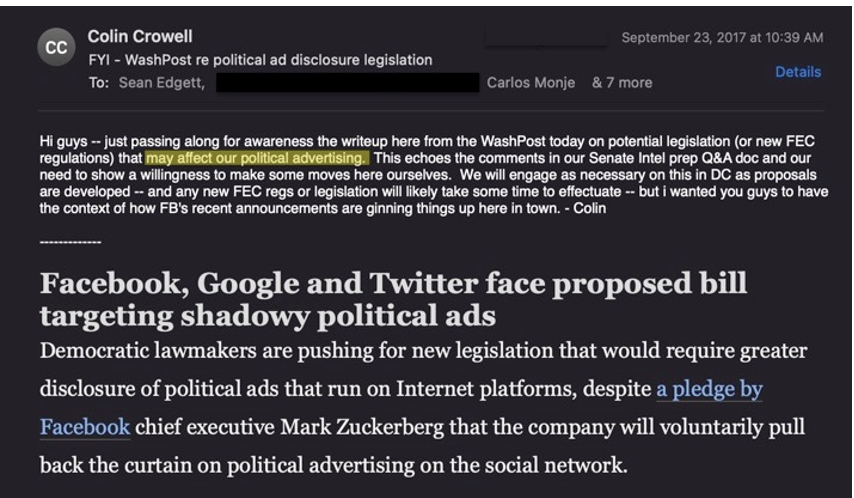
22.“Hi guys.. Just passing along for awareness the writeup here from the WashPost today on potential legislation (or new FEC regulations) that may affect our political advertising,” wrote Crowell. 
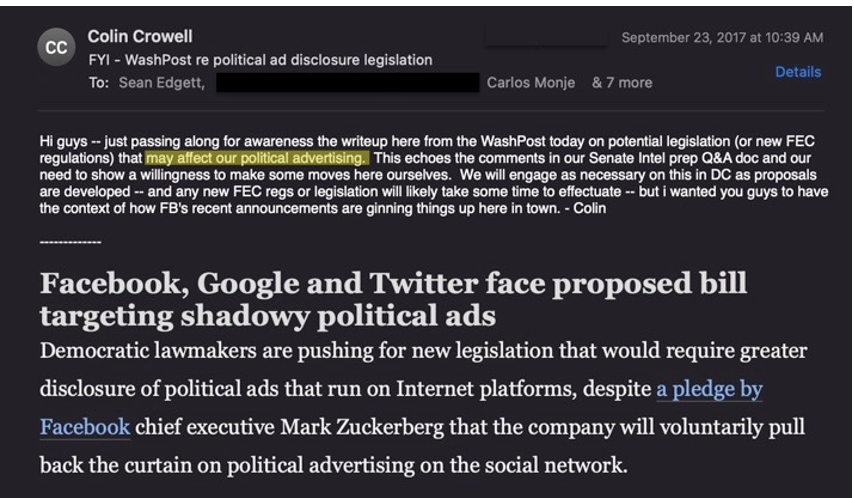
23. In Washington weeks after the first briefing, Twitter leaders were told by Senate staff that “Sen Warner feels like tech industry was in denial for months.” Added an Intel staffer: “Big interest in Politico article about deleted accounts." 



25.“Knowing that our ads policy and product changes are an effort to anticipate congressional oversight, I wanted to share some relevant highlights of the legislation Senators Warner, Klobuchar and McCain will be introducing,” wrote Policy Director Carlos Monje soon after. 
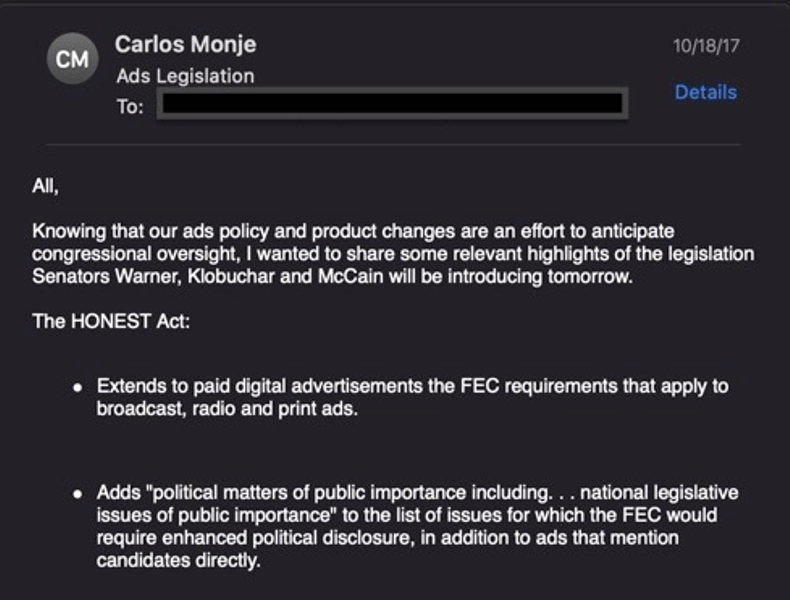
26.“THE COMMITTEES APPEAR TO HAVE LEAKED” Even as Twitter prepared to change its ads policy and remove RT and Sputnik to placate Washington, congress turned the heat up more, apparently leaking the larger, base list of 2700 accounts. 

27.Reporters from all over started to call Twitter about Russia links. Buzzfeed, working with the University of Sheffield, claimed to find a “new network” on Twitter that had “close connections to… Russian-linked bot accounts.” 
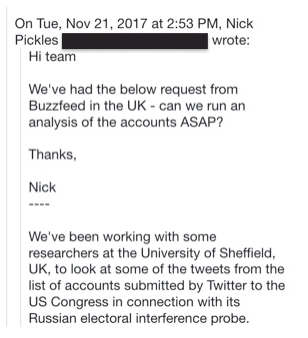
28.“IT WILL ONLY EMBOLDEN THEM.” Twitter internally did not want to endorse the Buzzfeed/Sheffield findings: 


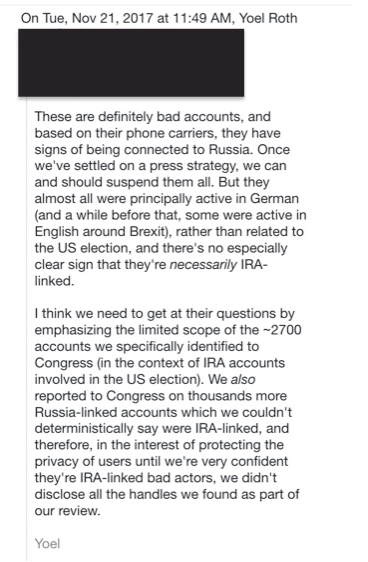


29. “SENATE INTEL COMMITTEE IS ASKING… POSSIBLE TO WHIP SOMETHING TOGETHER?” Still, when the Buzzfeed piece came out, the Senate asked for “a write up of what happened.” Twitter was soon apologizing for the same accounts they’d initially told the Senate were not a problem. 
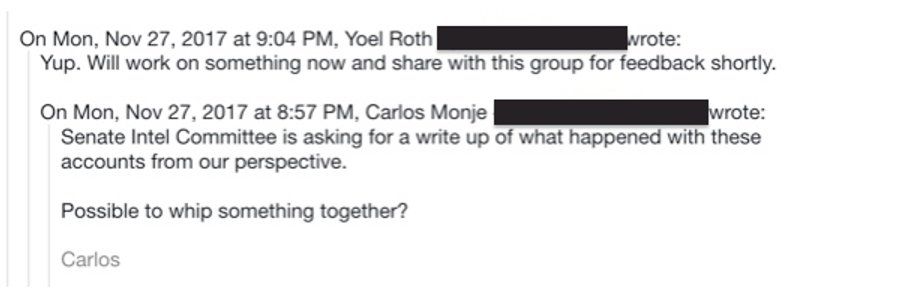
30.“REPORTERS NOW KNOW THIS IS A MODEL THAT WORKS”
This cycle – threatened legislation, wedded to scare headlines pushed by congressional/intel sources, followed by Twitter caving to moderation asks – would later be formalized in partnerships with federal law enforcement.
This cycle – threatened legislation, wedded to scare headlines pushed by congressional/intel sources, followed by Twitter caving to moderation asks – would later be formalized in partnerships with federal law enforcement.
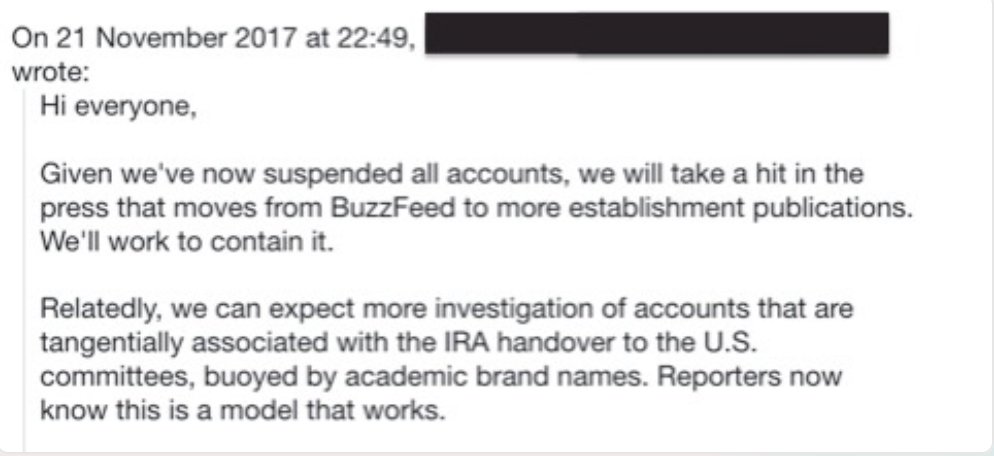
31.Twitter soon settled on its future posture.
In public, it removed content “at our sole discretion.”
Privately, they would “off-board” anything “identified by the U.S.. intelligence community as a state-sponsored entity conducting cyber-operations.”
In public, it removed content “at our sole discretion.”
Privately, they would “off-board” anything “identified by the U.S.. intelligence community as a state-sponsored entity conducting cyber-operations.”

32.Twitter let the “USIC” into its moderation process. It would not leave.
Wrote Crowell, in an email to the company’s leaders:
“We will not be reverting to the status quo.”
Wrote Crowell, in an email to the company’s leaders:
“We will not be reverting to the status quo.”

33.For more on the #TwitterFiles, check out @bariweiss, @ShellenbergerMD, @lhfang, and @davidzweig.
Watch this space shortly for another thread…
Watch this space shortly for another thread…
• • •
Missing some Tweet in this thread? You can try to
force a refresh



